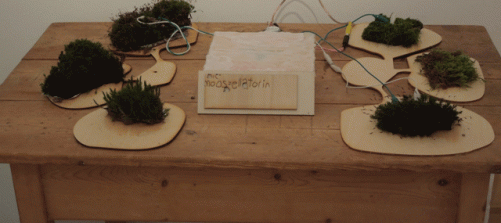Miss Baltazar’s Laboratory
This is why in Vienna some women and trans joined as MBL. The aim was to foster feminist approaches towards technologies, technologies taking the female perspective as central point to embark from. On MBL’s agenda was fighting harassment in labs and to demystify technology, take apart hardware and invent new techniques, create new role-models and encourage females to become tech savvy. It started as an experiment in 2009 and it started growing quickly, once it had an autonomous space in Vienna. When the new space grew too small also, the collective migrated to a 100 square meter space.
In this feminist hackerspace reading groups, Open Lab Sessions, exhibitions, workshops on open hardware and open software, lectures and discussions take place. Around 170 women and trans are part of the mailing list. The organizer’s core team consists of six artists. Personal authorship is exchanged with collaborative, multiple authorships. One of the projects that were developed collaboratively at MBL is called Mosszillator: This instrument was built from moss and oscillators. Touching and pressing the moss created different resistances that controlled the sound. A tree served as an amplifier to the sound signal via transducer. Many different people added their ideas to this project, brought along new electronic elements that would fit and finally showed the finished project in an exhibition.
Other access
Participants of our space had searched access in other places before they joined MBL: e.g. corporate companies that offered them equipment and education. Yet these companies were taking credit for whatever they developed inside the company’s premises. Other participants had attended expensive elite universities to seek resources to realize their projects, but were confronted with the dilemma of sacrificing one’s new gained freedom to the back-payment of enormous tuition fees.
Others had tried to learn from pioneers and more established feminist groups like the genderchangers, subRosa or the old boys network. The women who created these important structures are by now happy to leave the legacy of endless fighting and struggling in younger hands. Many have disappeared.
Some rare personalities, the ones who are equipped with a sharp tongue and indifference towards harassment, stayed for years in hackerspaces and used these high-tech-rich environments to learn about the things they were interested in.
But at some point all of the groups described above visit the feminist hackerspace and dream about access to networks, tools, skills, platforms without the drawbacks they have experienced in other technology related places. This attitude differs strongly from cyberfeminist`s perception of the „Internet as a means of freedom from social constructs like gender and sex difference“ (Haraway, 1991) (* 11 ). The feminist hackerspace approach towards experiences of exclusion is more pragmatic. The belief in the possibility of a spontaneous or temporary autonomous space that is free from gender difference has faded (Hakim, 1991)
(* 11 ). The feminist hackerspace approach towards experiences of exclusion is more pragmatic. The belief in the possibility of a spontaneous or temporary autonomous space that is free from gender difference has faded (Hakim, 1991) (* 10 ) and given place to the insight that the reflections upon the conditions of exclusion can`t be avoided.
(* 10 ) and given place to the insight that the reflections upon the conditions of exclusion can`t be avoided.
Stefanie Wuschitz ( 2013): Female Makers. In: p/art/icipate – Kultur aktiv gestalten # 02 , https://www.p-art-icipate.net/female-makers/




 Artikel drucken
Artikel drucken